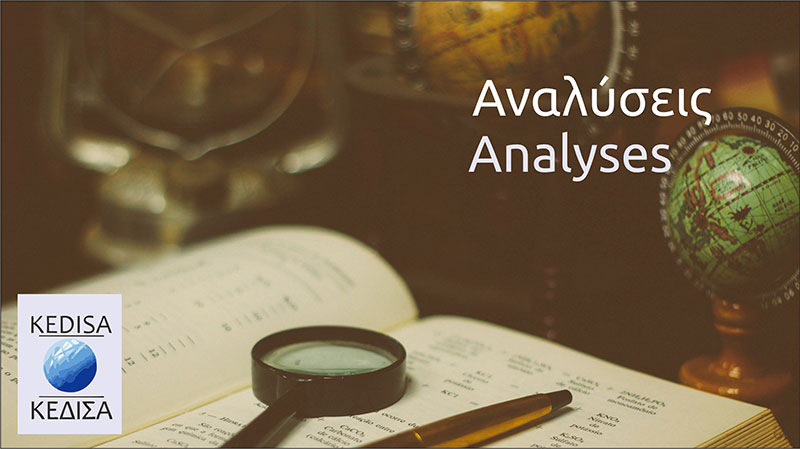By Konstantinos Anagnostakis, Analyst KEDISA
In November 2024, Hungarian Prime Minister Viktor Orbán extended an invitation to his Israeli counterpart, Benjamin Netanyahu, to visit Hungary. On April 3rd, the meeting was held, with Netanyahu arriving in Budapest despite an active arrest warrant issued by the International Criminal Court (ICC). Shortly after the visit, Hungary announced its intention to withdraw from the ICC after 23 years of membership. During a joint press conference with Netanyahu, Orbán defended the move by accusing the Court of devolving into a politically motivated and corrupt institution (Kottasová, 2025). Rather than upholding its rule of law-based objectives, he argued, the ICC has developed antisemitic tendencies, targeting democratic countries like Israel (Kottasová, 2025).
This paper explores Hungary’s withdrawal from the International Criminal Court and its implications for the European Union. It examines Hungary’s recent political trajectory, and the external pressures influencing this decision, notably US sanctions on the ICC. Then, the paper discusses the legal, political, and diplomatic consequences of Hungary’s departure, the potential for further fragmentation within the EU, and the need for urgent decisions to preserve the Union’s unity and global influence.
Hungary in the international community
Hungary is an active participant in numerous international organizations, such as the United Nations (UN), the European Union (EU) and the North Atlantic Treaty Organization (NATO). As a UN member since 1955, the country is automatically a party to the Statute of the International Court of Justice (ICJ), which forms an integral part of the UN Charter. Regarding the International Criminal Court, Hungary was among the original 60 states to ratify the Rome Statute —the treaty that established the ICC— in 2001, contributing to the Court’s official establishment in 2002. While Hungary now intends to withdraw from the ICC, it follows the example of Burundi in 2017 and the Philippines in 2019, both of which previously withdrew from the Court. However, Hungary will be the first European Union member state to do so, marking a significant shift in an era of uncertainty, crises and political, economic and social instability worldwide.
What has changed?
Over the past decade, Hungary’s legal and constitutional systems have undergone major changes under Prime Minister Viktor Orbán and the Fidesz party, significantly affecting the rule of law. In 2015, a state of emergency was declared, enabling the government to bypass standard legislative procedures (Mészáros, 2024). Several amendments were introduced, including to the Asylum Act and the Fundamental Law, which further expanded the government’s power to rule ‘by decree’, sidelining Parliament and civil society (Hungarian Civil Liberties Union, 2024). This fast-track legislative process has centralized power, bypassed third-party consultation and overridden judicial oversight. This is reflected in the World Justice Project’s Rule of Law Index, where Hungary scores last in the factor ‘Constraints on Government Powers’ among EU countries (World Justice Project, n.d.). As a result, Orbán has concentrated unprecedented powers, enabling his ruling party to shape the country’s future with little to no accountability.
Additionally, external pressures have played a significant role in shaping the momentum behind the Hungarian PM’s decision. For instance, the Executive Order 14203, which US President Donald Trump signed on February 6, 2025, imposing sanctions on ICC (The White House, 2025). This order was a direct response to the court’s actions concerning investigations into alleged war crimes involving US personnel and allies. It imposes visa restrictions and financial penalties on individuals associated with the ICC who are involved in investigating or prosecuting U.S. citizens or officials from allied nations. This includes targeting ICC officials, such as its Chief Prosecutor, Karim A.A. Khan KC who has prosecuted and issued arrest warrants against Israeli PM Netanyahu and former Israeli Defense Minister Yoav Gallant on committing war crimes and crimes against humanity during the Gaza conflict (International Criminal Court, 2024). According to the Ambassador of Israel in the US, these sanctions are expected to expand within the next few weeks, putting more pressure to ICC members.
Are there any consequences?
Despite Orbán’s plan to withdraw from ICC membership, the process requires formal notification to the United Nations Secretary-General and takes one year to take effect. Until the withdrawal is official, Hungary remains obligated to respect and implement the ICC’s decisions. This entails two key points: first, Hungary is still required to adhere to the Court’s rulings; second, it may face political, diplomatic, and economic sanctions or consequences from the Court, its members, or fellow EU states. Like other international courts, ICC is powerless to force member states to comply with its decisions, even – as in this instance – when they fail to execute an arrest warrant issued by the Court. Since the court itself has no enforcement mechanism over sovereign states, it is ultimately only public opinion and the reputation of the States Parties that can lead states to comply with their international law obligations.
It is worth noting that Russian President Vladimir Putin, close ally to Orbán, faced an arrest warrant issued on March 17, 2023. Nevertheless, the Russian President traveled to Mongolia —also an ICC member— for official talks in September 2024, without being detained. Despite the members obligation to detain individuals-suspects under the Rome Statute upon them entering its territory, Mongolia ignored calls from the international community and welcomed the Russian President. To date, no consequences have been announced by the ICC regarding Mongolia’s actions (Al Jazeera, 2024). On the other hand, there were cases where an arrest warrant had a deterrent effect. In 2023, South Africa was plunged into a domestic and international diplomatic crisis over Putin’s expected attendance at the annual summit for BRICS in Johannesburg. In the end, Russia’s Foreign Minister Sergei Lavrov attended, in the President’s place, after the two countries reportedly reached an agreement. This outcome suggests the ICC arrest warrant did have an impact on this occasion, deterring Putin’s travel plans and influencing his diplomatic positioning (Green, 2024).
What are the implications for the EU?
Hungary’s departure from the ICC has serious implications for the EU. From a legal standpoint, it undermines the EU’s collective commitment to international justice and the rule of law —principles that form the foundation of the Union’s identity. It also signals an alarm in Western coherence and unity, at a moment when international law is needed the most —particularly in response to the Russian war crimes in Ukraine and efforts to ensure accountability.
The political ramifications are equally significant in the context of changing global dynamics. Hungary’s close ties with Russia combined with a fragmented transatlantic partnership —particularly under the Trump administration— turns the move into a politically charged act. Orbán’s decision aligns with the US president’s antagonism toward the ICC and further weakens the Western bloc’s stance on international justice. Moreover, Hungary has consistently been one of Russia’s most vocal European supporters, blocking or delaying EU sanctions and resisting military aid to Ukraine through its veto power. In this context, Hungary’s exit from the ICC may appear as an ‘indirect shield’ to Russia, particularly concerning the ICC’s arrest warrant for President Putin over his role in the Ukraine conflict. This raises the prospect of Putin being able to visit Hungary without fear of arrest, echoing how the Israeli PM has similarly avoided ICC enforcement.
Final remarks
In a world already plagued by multiple crises, Hungary’s withdrawal from the ICC proves once again that the EU is in reality far away from functioning like a unified, cohesive organization. Beyond its commitment to the rule of law, Hungary’s decision exposes the EU’s internal fragility and political dichonoia. These internal divisions, combined with external pressures such as the impact of Trump-era policies, keep getting in the way of the EU’s ability to address present and future challenges effectively.
Yet, every crisis provides the ground for transformation. From this perspective, Hungary’s move could act as a catalyst for renewed debates within EU institutions over the need for enforcement mechanisms or penalties to ensure member’s adherence to international treaties. Should other countries follow Hungary’s example, the EU risks further fragmentation in its stance on international law and global governance.
Ultimately, the EU cannot afford to underestimate the wider implications of Hungary’s withdrawal. Instead, it must initiate discussions on how to preserve its unity and effectiveness in addressing global challenges —discussions that must lead to concrete actions. The EU has to find a careful balance to ensure it can speak and act with one voice. Failing to do so could accelerate the divisions within the Union and further diminish its influence on the world stage.
References
Al Jazeera. (2024, August 30). Russia’s Putin to visit ICC member Mongolia despite arrest warrant. Al Jazeera. https://www.aljazeera.com/news/2024/8/30/russias-putin-to-visit-icc-member-mongolia-despite-arrest-warrant
Green R. (2024, September 30). Putin’s visit to Mongolia defies ICC arrest warrant as world looks on. International Bar Association. https://www.ibanet.org/putin-visit-to-mongolia-defies-icc-arrest-warrant-as-world-looks-on
Hungarian Civil Liberties Union. (2024). The state of danger would be extended again with a one-sentence justification. HCLU. https://hclu.hu/en/articles/the-state-of-danger-would-be-extended-again-with-a-one-sentence-justification
International Criminal Court (May 20, 2024). Statement of ICC Prosecutor Karim A.A. Khan KC: Applications for arrest warrants in the situation in the State of Palestine. Statement of ICC Prosecutor Karim A.A. Khan KC: Applications for arrest warrants in the situation in the State of Palestine | International Criminal Court
Kottasová I., April 4, 2025. Hungary says it will pull out of ICC as Orbán hosts Israel’s Netanyahu – who is wanted by the court. CCN World. Hungary says it will pull out of ICC as it hosts Israel’s Netanyahu – who is wanted by the court | CNN
Mészáros, G. (2024). How misuse of emergency powers dismantled the rule of law in Hungary. Israel Law Review, 1-20.
The White House (February 6, 2025). Imposing sanctions on the International Criminal Court. Imposing Sanctions on the International Criminal Court – The White House
World Justice Project. (n.d.-b). Rule of Law Index: Hungary (2024). World Justice Project. https://worldjusticeproject.org/rule-of-law-index/country/2024/Hungary/
 English
English

